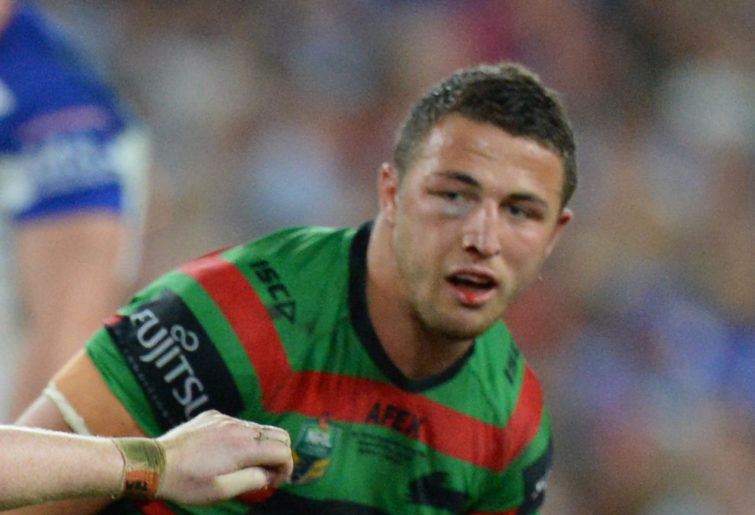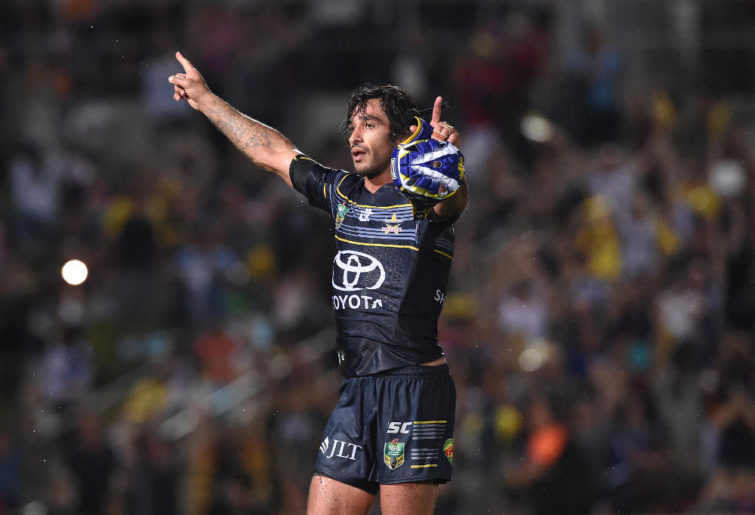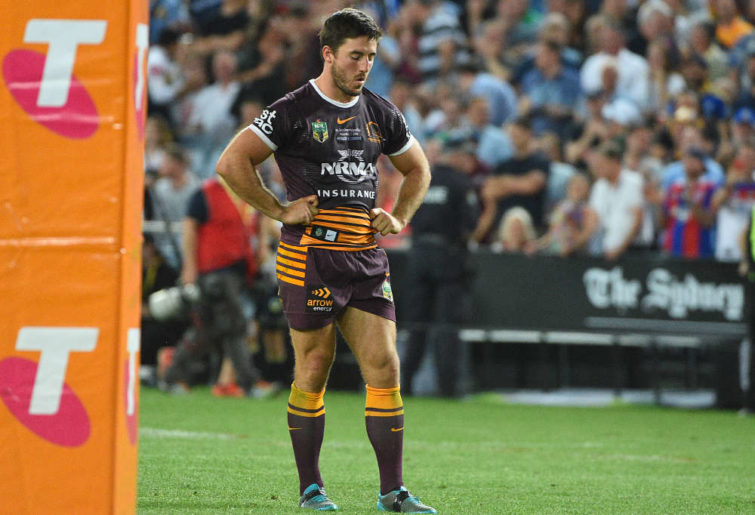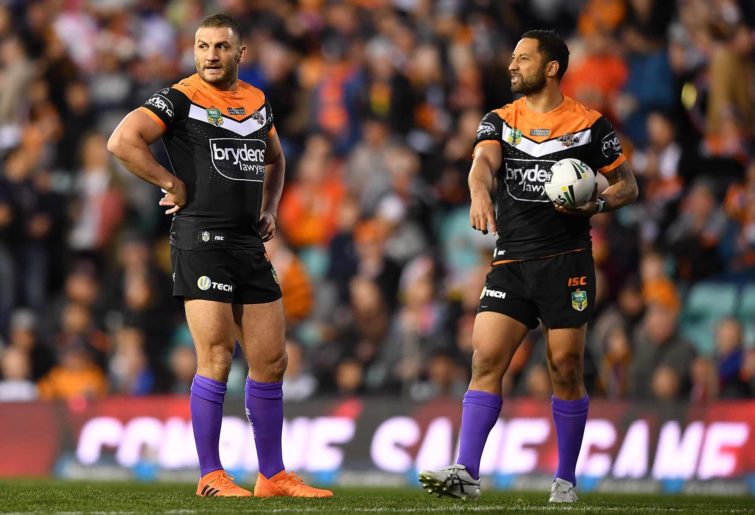The NRL stat that isn't a stat but should be a stat: Working out which forwards really pull their weight
Who are the hardest working big men in the NRL?
In this weekend’s flashback of the would-be Round 5 match-ups, we revisit a high-scoring match from 2017, grand final victories by the Knights, Rabbitohs, Cowboys and Panthers, and a major upset from 2004.
While the current NRL season remains suspended due to the ongoing COVID-19 pandemic, there is talk that the season could possibly resume by early-June, in which case all the teams could be based somewhere in the middle of nowhere or Queensland.
In the meantime, let’s take a trip down memory lane as we look back at some classic matches between the two sides that would’ve met this weekend.
1997 grand final: Knights 22 defeated Sea Eagles 16
We kick off this Round 5 flashback with arguably one of the greatest grand finals of the nineties.
The Super League war which engulfed the sport in Australia saw the line-up of teams split into two – with the Broncos, Bulldogs, Cowboys, Sharks and Panthers among those to participate in the only season of the Australian Super League.
Meanwhile, many other teams like the Roosters, Rabbitohs, Sea Eagles, Knights and Dragons would plough on in the ARL season, which culminated in the grand final between the reigning premiers, the Manly-Warringah Sea Eagles, and the Newcastle Knights.
The Sea Eagles were playing in their third consecutive grand final, and started favourites to successfully defend their premiership.
Nearly midway through the second half, the Silvertails led by 16-8 when a penalty goal to Andrew Johns saw the Knights peg the margin back to 16-10 entering the final minutes of the game.
With five minutes remaining, Robbie O’Davis would score for the Knights, with the successful conversion from Johns seeing the scores locked at 16-all.
But just as it seemed the match would go to extra time, Darren Albert would etch his name into history, scoring the match winning try at the death to secure the Knights their first premiership in what was their tenth season in the competition.
This led Channel Nine commentator Ray Warren to proclaim that “Newcastle have won the grand final!”. Johns’ successful conversion saw the score finish 22-16 in their favour.
It was the first of two premierships the Novocastrians would win in the space of five years, also winning in 2001 when they upset the rampaging hot favourites the Parramatta Eels in the first night-time NRL grand final at the Olympic stadium.
2014 grand final: Rabbitohs 30 defeated Bulldogs 6
After 43 frustratingly long years, Souths fans finally had something to cheer about in 2014.
The club had gone through hell and back in the intervention, being kicked out of the NRL in 1999 before being readmitted into the competition in 2002 following court action from Sydney solicitor Nick Pappas.
Which is why their 2014 premiership win should be considered the most sweetest of the 21 they have won.
Fielding a side with names such as Greg Inglis, the Burgess brothers, long-serving stalwart John Sutton and co., the Bunnies had finally found the right ingredients to win the title, and they delivered.
The grand final saw them pitted up against the Bulldogs, who were appearing in their second decider in three years but were seeking their first premiership in a decade.
However, it was the Rabbitohs who started favourites, and their fans would have their hearts in their mouths when Sam Burgess suffered a cheekbone injury in the opening few seconds.

Sam Burgess’ 2014 grand final performance showed just how tough he is. (AAP Image/Dean Lewins)
History would tell us that he would bravely play out the remainder of the match, echoing memories of John Sattler playing through the 1970 grand final with a broken jaw, and win the Clive Churchill Medal as the best on ground.
The Bunnies had only led 6-0 at halftime, and by 14-6 with less than ten minutes to go, until three tries in the final seven minutes saw them win by the scoreline of 30-6.
Fittingly, it was Greg Inglis, who joined the club after being forced out of the Melbourne Storm at the end of 2010, who scored the game’s final try, with his goanna celebration sparking wild celebrations from ANZ Stadium all the way to Redfern.
It was also his first valid premiership ring after the titles he won with the Storm in 2007 and 2009 were annulled due to salary cap breaches.
Sam Burgess then left the club for a brief stint in English rugby union, but would find himself back at Redfern Oval in 2016, remaining with the club until his retirement last year.
2015 grand final: Cowboys 17 defeated Broncos 16
The following year, rugby league fans were treated to another beauty when the Brisbane Broncos and North Queensland Cowboys contested the first ever all-Queensland NRL grand final.
As the Broncos and Cowboys dominated the regular season, the question had to be asked as to whether any other team could stop them from facing off in the decider.
Three months after Queensland thrashed New South Wales by a record 52-6 in the State of Origin series decider at Suncorp Stadium, the final nail in the Blues coffin came when the two premier Queensland clubs set up the all-Maroon decider on October 4 at ANZ Stadium.
It was just the second time that two out-of-towners met in the final game of the season, after the Broncos defeated the Storm 15-8 to win their sixth title in 2006. It was also the first decider to have both sides captained by Indigenous Australians.

Johnathan Thurston: one of the NRL’s best ever. (AAP Image/Dave Hunt)
Wayne Bennett’s side were therefore seeking their first title since then, and seventh overall, while the Cowboys were back in the big dance for the first time since their only other appearance – losing to the Wests Tigers in the 2005 decider.
The Broncos, which to that point in their history had never lost a grand final, fired the first shot with Corey Oates scoring the first try, but the Cowboys would hit back shortly after through Justin O’Neill. At halftime, the Broncos led 14-12.
A Jordan Kahu penalty goal saw the Broncos extend their lead to 16-12 shortly after halftime, and there would be no further scoring for over the next half hour of play.
Just as it seemed the Broncos would hold on to win their seventh premiership, Johnathan Thurston and Michael Morgan would combine to put Kyle Feldt in the corner right at the death.
After the video referee awarded the try, Thurston had the chance to win the premiership for his beloved club with a sideline conversion.
Just as it appeared online, it hit the upright, meaning for the first time in rugby league history, the grand final would be decided in golden point.
After the Cowboys kicked off to begin golden point, Ben Hunt would drop the catch, giving the Cowboys the territory they needed to potentially score the winning points.
Thurston would then make up for his conversion miss at the end of regular time, booting a field goal in the 83rd minute to finally deliver the Cowboys their first premiership, a decade after they were denied by the Wests Tigers in their first grand final.
Though it was the club’s maiden title, it was Thurston’s second premiership ring, after also being a 21-year-old interchange player in the Bulldogs side that was victorious over the Sydney Roosters in 2004.
As for the Broncos, it marked their first defeat in a grand final, and as of 2019 are currently experiencing their worst premiership drought, which currently stands at 13 completed seasons.
For Wayne Bennett, it was also his first grand final defeat as coach, having presided over the Broncos’ six titles and the Dragons’ 2010 premiership.

Ben Hunt (AAP Image/Mick Tsikas)
Round 10, 2017: Titans 38 defeated Storm 36
While recent history has not been kind to the Gold Coast Titans, there is one result they can look back on with fondness.
Back when Suncorp Stadium regularly hosted double headers, the Titans headed up the highway for a Saturday twilight clash with the Storm, who took their home game to Brisbane to make the Suncorp double header possible.
Craig Bellamy’s side entered the match as heavy favourites to win, and their chances of winning multiplied as the Titans suffered numerous injuries to key players as the match went on.
Among the Titans’ injuries, Ryan Simpkin lasted only three minutes before his knee gave way, while Dan Sarginson and Jarryd Hayne left the game in the second half with a suspected broken arm and a leg injury, respectively. This left the club with only 14 fit men to play.
With ten minutes to go, the men from the holiday strip were all but beaten, only for Tyrone Roberts and Konrad Hurrell to score tries that would see the underdogs lead 38-36 with a minute to play.
Ultimately, they would hang on to score one of the finest wins in the club’s history, but only three months later, coach Neil Henry would be given his marching orders after a falling out with Jarryd Hayne and many other senior players.
Round 22, 2004: Sharks 26 defeated Roosters 12
The Sydney Roosters’ march to the 2004 minor premiership hit a major hurdle when, in Round 22, the Chooks suffered a shock home defeat at the hands of the Sharks on a wintry Sunday afternoon at what was then known as Aussie Stadium.
A superb effort in defence by the Sharks saw the Roosters score only two tries, while the Stuart Raper-coached side managed four of their own to record their second top four win away from home in 2004.
Anthony Minichiello had scored the first try of the game for the Roosters, but the Sharks would not look back after tries to Ryan McGoldrick and Nathan Merritt saw them lead 14-6 at halftime.
Ultimately, the Roosters had to make 118 more tackles than their opponents, their extra work in defence ultimately causing their attack to be non-existent.
The result proved costly for the men from Bondi Junction as they slipped to second on the ladder at the end of the round, after the Bulldogs defeated the Cowboys by 36-16 across town at Giants Stadium at the same time the Roosters-Sharks match was being played.
1991 grand final: Panthers 19 defeated Raiders 12
While the Penrith Panthers’ 2003 premiership remains a topic of discussion among rugby league circles, for some rugby league fans it’s also easy to forget that they also tasted the same success in 1991.
The Panthers had lost the 1990 decider to the Raiders, but were back in the big dance just twelve months later for another shot at their first premiership.
The Green Machine, captained by Mal Meninga and fielding the game’s best halfback in Ricky Stuart, led 12-6 at halftime and looked to have a third consecutive premiership in the bag.
However, the mountain men, then coached by Phil Gould, would hit back in the second half, keeping their opponents scoreless in the second half while piling on 13 unanswered points in the process.
At 12-all, and with less than ten minutes remaining, it was still anyone’s game. At this point, Greg Alexander would kick a field goal, giving the Panthers a 13-12 lead, before a try to Royce Simmons in the final game of his career gave the mountain men a 19-12 victory, and their first premiership title.
Simmons later became coach of the club after Phil Gould was sacked towards the end of the 1994 season, but would not achieve the same success as coach, receiving his marching orders after the club crashed to a wooden spoon finish in 2001.
Teenage centre Brad Fittler would later captain New South Wales to a State of Origin series win in 2000 in which they whitewashed Queensland 3-0, and the Sydney Roosters to the 2002 premiership.
Round 13, 2010: Dragons 22 defeated Warriors 20
Halfway through the 2010 season, which proved to be a fruitful one for the St George Illawarra Dragons, they faced a serious test of their premiership credentials when they crossed the ditch to face the New Zealand Warriors in Auckland.
The Red V were on a mission to bury the demons of 2009 in which they finished as minor premiers, yet crashed out of September in straight sets. And while the finals were still three months away, they were only going to take things one week at a time.
They quickly found themselves down 6-0 after James Maloney scored first for the Warriors, but the Dragons would score either side of halftime to take the lead, and the see-saw encounter continued with the lead changing hands several times in the second 40 minutes.
A try to Jamie Soward saw the Dragons lead 22-14 going into the closing stages, but the home side would peg back another try to make the final scoreline 22-20 in the Red V’s favour.
Afterwards, coach Wayne Bennett said his side played like “ugly ducklings” but at the same time lauded their toughness in defence, which proved to be the club’s strength in 2010.
Round 24, 2010: Wests Tigers 20 defeated Eels 18
Staying in the 2010 season, and with September looming, the Parramatta Eels and Wests Tigers contested a thrilling match which could have been decided in extra time, if not for a missed shot at a penalty goal from one of the Eels’ most reliable goalkickers.
We’ll get to that shortly, but first, the Eels went into their Round 24 game against the Tigers needing a win to remain in the finals hunt, having returned to Sydney off the back of an impressive 30-14 win over the Broncos in Brisbane the previous week.
The Eels started the game poorly, but could consider themselves to be lucky to trail 10-6 at halftime after the Tigers bombed at least three tries in the first half.
But it was the brilliance of Benji Marshall that showed as the Tigers shot out to a 20-6 lead with over ten minutes remaining, and by that stage they appeared to all but have a home final sewn up (under the old finals system, the top four sides would play a home final in the first week).

Robbie Farah (left) and Benji Marshall of the Tigers. (AAP Image/Joel Carrett)
However, the Eels would score two tries in quick succession, through Justin Horo and Anthony Mitchell, to peg the scoreline back to 20-18 and set up a frantic final few minutes as the hosts fought tooth and nail to keep their finals hopes alive.
Then, with less than one minute remaining on the clock, Eels veteran Luke Burt had the chance to force golden point with a simple penalty goal conversion, only for his shot to go wide, leaving his side to taste the bitterness of defeat after such a gutsy comeback.
Ultimately, the Eels would lose their final two games of the season, seeing them sidelined from September just twelve months after they made the grand final from eighth place, and the poisoned chalice that is the Eels’ head coaching position became vacant with the dismissal of Daniel Anderson.